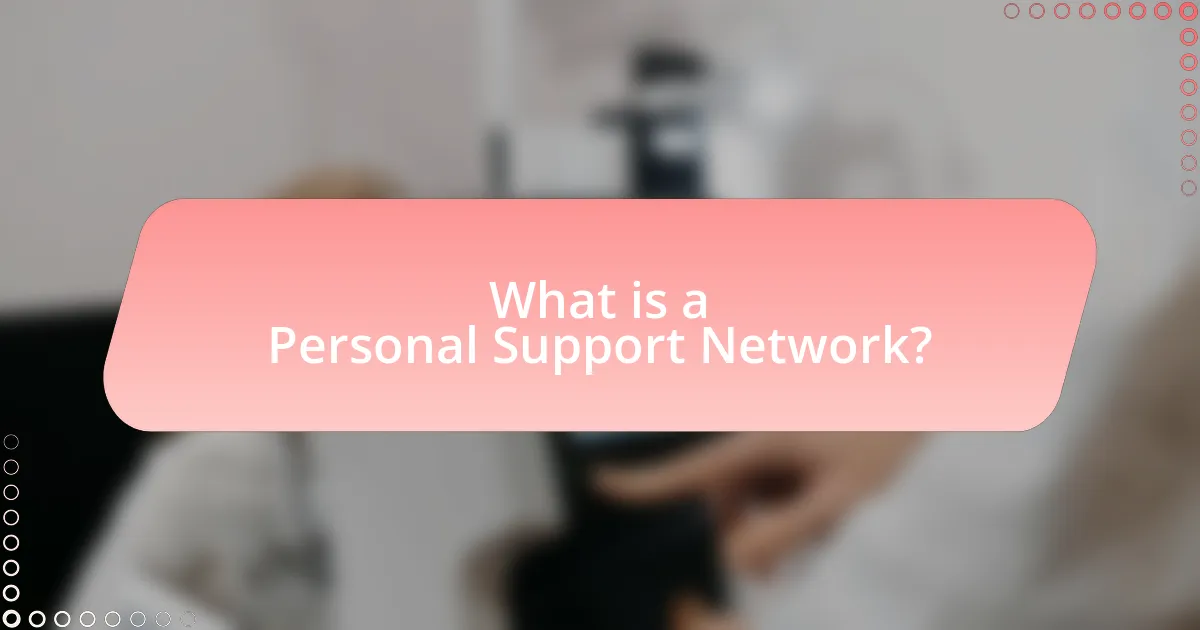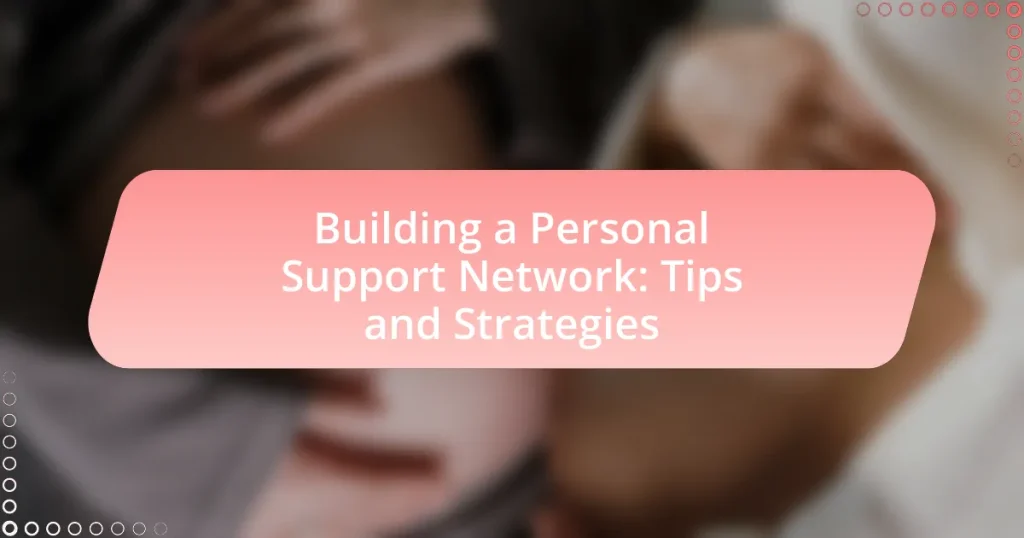A Personal Support Network is a collective of individuals, including family, friends, colleagues, and professionals, who provide essential emotional, informational, and practical support to enhance an individual’s well-being. This article outlines the significance of such networks in improving mental health, reducing stress, and fostering personal development. It discusses the roles various relationships play within the network, strategies for identifying support needs, and methods for building and maintaining these connections. Additionally, it addresses potential challenges in forming a support network and how technology can facilitate these relationships. Practical tips for nurturing these connections are also provided, emphasizing the importance of regular communication and shared experiences.

What is a Personal Support Network?
A Personal Support Network is a group of individuals who provide emotional, informational, and practical support to a person. This network typically includes family members, friends, colleagues, and professionals who contribute to the individual’s well-being and resilience. Research indicates that having a strong personal support network can enhance mental health, reduce stress, and improve overall life satisfaction, as evidenced by studies showing that social support is linked to better health outcomes and increased longevity.
Why is a Personal Support Network important?
A Personal Support Network is important because it provides emotional, social, and practical assistance, which enhances overall well-being. Research indicates that individuals with strong support networks experience lower levels of stress and improved mental health outcomes. For instance, a study published in the Journal of Health and Social Behavior found that social support significantly correlates with lower rates of depression and anxiety. This demonstrates that having a reliable network can lead to better coping strategies during challenging times, ultimately contributing to a healthier and more resilient individual.
How does a Personal Support Network impact mental health?
A Personal Support Network significantly enhances mental health by providing emotional, informational, and practical support. Individuals with strong support networks experience lower levels of stress, anxiety, and depression, as these connections foster a sense of belonging and security. Research indicates that social support can lead to improved coping strategies and resilience, which are crucial for mental well-being. For instance, a study published in the Journal of Health and Social Behavior found that individuals with robust social ties reported better mental health outcomes and lower rates of psychological distress. This evidence underscores the critical role that a Personal Support Network plays in promoting mental health.
What role does a Personal Support Network play in personal development?
A Personal Support Network plays a crucial role in personal development by providing emotional, informational, and practical support that fosters growth and resilience. This network, consisting of family, friends, mentors, and peers, enhances self-awareness and motivation, enabling individuals to set and achieve personal goals. Research indicates that social support is linked to improved mental health outcomes, as evidenced by a study published in the Journal of Health and Social Behavior, which found that individuals with strong support networks experience lower levels of stress and higher levels of life satisfaction. Thus, a Personal Support Network is essential for navigating challenges and facilitating personal growth.
Who can be part of a Personal Support Network?
A Personal Support Network can include family members, friends, colleagues, mentors, and professionals such as therapists or social workers. These individuals provide emotional, practical, and informational support, which is essential for personal well-being. Research indicates that strong social connections can enhance mental health and resilience, as evidenced by studies showing that individuals with supportive networks experience lower levels of stress and improved overall health outcomes.
What types of relationships should be included in a Personal Support Network?
A Personal Support Network should include relationships with family, friends, colleagues, mentors, and community members. Family members often provide emotional support and stability, while friends can offer companionship and understanding. Colleagues can assist with professional growth and networking opportunities. Mentors provide guidance and advice based on their experiences, and community members can offer resources and social connections. Research indicates that diverse relationships enhance emotional well-being and resilience, making a well-rounded support network essential for personal development and coping strategies.
How do different roles within a Personal Support Network contribute to support?
Different roles within a Personal Support Network contribute to support by providing diverse forms of assistance tailored to individual needs. For instance, emotional supporters offer empathy and understanding, which can enhance mental well-being, while practical supporters assist with daily tasks, thereby reducing stress. Research indicates that individuals with a well-rounded support network experience improved health outcomes, as evidenced by a study published in the Journal of Health and Social Behavior, which found that social support significantly correlates with lower levels of depression and anxiety. Each role, whether it be a friend, family member, or professional, plays a crucial part in creating a comprehensive support system that addresses various aspects of a person’s life.
How can one identify their needs for a Personal Support Network?
To identify needs for a Personal Support Network, one should assess their emotional, social, and practical support requirements. This involves reflecting on areas where support is lacking, such as during stressful life events, health challenges, or when pursuing personal goals. Research indicates that individuals benefit from diverse support sources, including friends, family, and professional contacts, which can enhance resilience and well-being. By evaluating specific situations where assistance is desired, individuals can pinpoint the types of relationships and resources necessary for their support network.
What questions should you ask to assess your support needs?
To assess your support needs, ask questions such as: “What specific challenges am I facing that require support?” This question helps identify the areas where assistance is necessary. Additionally, inquire, “Who in my life can provide the support I need?” This question focuses on identifying potential supporters within your network. Another important question is, “What type of support do I prefer—emotional, practical, or informational?” This helps clarify the kind of assistance that would be most beneficial. Lastly, ask, “How often do I need support, and in what situations?” This question determines the frequency and context of support required. These questions collectively guide the assessment of personal support needs effectively.
How can self-reflection help in identifying support requirements?
Self-reflection aids in identifying support requirements by allowing individuals to assess their emotional, social, and practical needs. Through self-reflection, individuals can evaluate their experiences, recognize patterns in their challenges, and determine specific areas where they require assistance. For instance, a study published in the Journal of Personality and Social Psychology found that self-reflection enhances self-awareness, which is crucial for understanding personal needs and seeking appropriate support. This process enables individuals to articulate their needs more clearly, leading to more effective communication with potential support networks.
What strategies can be used to build a Personal Support Network?
To build a Personal Support Network, individuals can utilize strategies such as identifying key relationships, engaging in community activities, and leveraging social media platforms. Identifying key relationships involves recognizing family, friends, and colleagues who can provide emotional and practical support. Engaging in community activities, such as volunteering or joining clubs, fosters connections with like-minded individuals, enhancing the support network. Leveraging social media platforms allows for maintaining and expanding relationships, facilitating communication and support exchange. Research indicates that strong social networks contribute to improved mental health and well-being, underscoring the importance of these strategies in building a robust Personal Support Network.
How can you effectively reach out to potential network members?
To effectively reach out to potential network members, initiate contact through personalized messages that highlight shared interests or mutual connections. Research shows that personalized outreach increases response rates by 29%, as individuals are more likely to engage when they feel a personal connection. Utilize platforms like LinkedIn to identify commonalities and craft tailored messages that resonate with the recipient’s background or goals. This approach not only demonstrates genuine interest but also establishes a foundation for meaningful relationships within your personal support network.
What are some best practices for maintaining relationships within your network?
To maintain relationships within your network, prioritize regular communication and engagement. Consistent outreach, such as checking in via email or social media, fosters connection and shows you value the relationship. Additionally, offering support, whether through sharing resources or providing assistance, strengthens bonds and encourages reciprocity. Research indicates that maintaining relationships through consistent interaction can lead to increased trust and collaboration, as highlighted in studies on social capital by Putnam (2000) in “Bowling Alone.” Furthermore, attending networking events or informal gatherings can enhance visibility and deepen connections, reinforcing the importance of face-to-face interactions in relationship maintenance.
What challenges might arise when building a Personal Support Network?
Building a Personal Support Network can present several challenges, including difficulty in identifying reliable individuals, establishing trust, and maintaining consistent communication. Individuals may struggle to find people who are genuinely supportive and available, leading to feelings of isolation. Trust issues can arise due to past experiences or fear of vulnerability, making it hard to open up to potential network members. Additionally, busy lifestyles can hinder regular interaction, which is essential for nurturing relationships within the network. These challenges can impede the effectiveness of the support network, ultimately affecting the individual’s well-being and ability to seek help when needed.
How can you overcome barriers to forming connections?
To overcome barriers to forming connections, individuals can actively engage in open communication and practice empathy. Open communication fosters trust and understanding, which are essential for building relationships. Empathy allows individuals to relate to others’ experiences and feelings, creating a deeper bond. Research indicates that effective communication skills and empathetic behavior significantly enhance interpersonal relationships, as shown in studies by the American Psychological Association, which highlight the importance of these skills in social interactions.
What strategies can help manage conflicts within your network?
Effective strategies to manage conflicts within your network include open communication, active listening, and establishing clear boundaries. Open communication fosters transparency, allowing individuals to express their concerns and perspectives without fear of judgment. Active listening ensures that all parties feel heard and understood, which can de-escalate tensions. Establishing clear boundaries helps define acceptable behaviors and expectations, reducing the likelihood of misunderstandings. Research indicates that organizations with strong communication practices experience 47% higher employee engagement, which correlates with better conflict resolution outcomes.
How can technology assist in building a Personal Support Network?
Technology assists in building a Personal Support Network by facilitating communication, enhancing connectivity, and providing access to resources. Various platforms, such as social media, messaging apps, and video conferencing tools, enable individuals to maintain relationships and share experiences in real-time, regardless of geographical barriers. For instance, a study by Pew Research Center in 2021 found that 72% of adults use social media to connect with friends and family, demonstrating the effectiveness of technology in fostering social ties. Additionally, online support groups and forums allow individuals to find communities with shared interests or challenges, further strengthening their support networks.
What online platforms are effective for connecting with others?
Effective online platforms for connecting with others include Facebook, LinkedIn, Twitter, and Instagram. Facebook allows users to join groups and engage with communities based on shared interests, facilitating connections. LinkedIn is specifically designed for professional networking, enabling users to connect with colleagues and industry professionals. Twitter offers real-time communication and engagement through tweets and hashtags, fostering connections around trending topics. Instagram focuses on visual content, allowing users to connect through shared images and stories. These platforms have millions of active users, making them effective for building personal support networks.
How can social media be leveraged to enhance your support network?
Social media can be leveraged to enhance your support network by facilitating connections with like-minded individuals and communities. Platforms such as Facebook, Twitter, and LinkedIn allow users to join groups, participate in discussions, and share experiences, which fosters a sense of belonging and support. Research indicates that 69% of adults in the U.S. use social media, providing a vast pool of potential connections for emotional and practical support. By actively engaging in these platforms, individuals can find resources, share challenges, and receive encouragement from others who understand their situations, thereby strengthening their overall support network.
What are some practical tips for nurturing your Personal Support Network?
To nurture your Personal Support Network, prioritize regular communication with your contacts. Engaging in consistent check-ins, whether through calls, texts, or in-person meetings, strengthens relationships and fosters trust. Additionally, actively listen and show genuine interest in their lives, which enhances emotional connections. Organizing group activities or social gatherings can also create shared experiences that deepen bonds. Research indicates that strong social ties contribute to improved mental health and resilience, highlighting the importance of maintaining these connections.
How often should you communicate with your network members?
You should communicate with your network members at least once a month. Regular communication fosters relationships and keeps you informed about each other’s developments. Research indicates that maintaining consistent contact enhances networking effectiveness, as highlighted in a study by the Harvard Business Review, which found that individuals who engage with their networks monthly are more likely to receive support and opportunities.
What activities can strengthen bonds within your Personal Support Network?
Engaging in regular communication, shared experiences, and collaborative activities can strengthen bonds within your Personal Support Network. Activities such as organizing group outings, participating in volunteer work, or hosting regular check-ins foster connection and trust. Research indicates that social interactions and shared goals enhance relationship quality, as evidenced by studies showing that collaborative tasks increase feelings of belonging and support among individuals.


